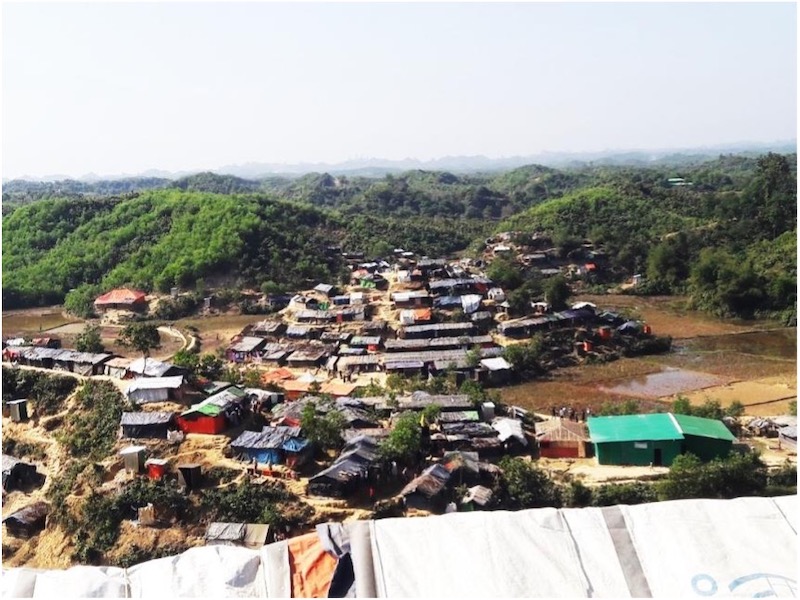Rohingya refugee crisis: Four years on
August 2021: On the night of August 25, 2017, the world witnessed the biggest refugee influx in history as 250,000 Muslim Rohingya people crossed the border of Bangladesh. They had walked barefoot for days, even weeks, experienced traumatic massacre events, lost family and friends and were blindly rambling towards a dark future without a destination.
This week, the CRJ will mark the four-year anniversary of this event with a series of blogs looking at aspects including gender-based violence, disaster risk reduction in the camps and how the Covid-19 pandemic has affected the community and those working there.
Part I: From cave to cage, gender-based violence towards Rohingya women
Farheen Malek has been working voluntarily with a medical team in Cox’s Bazar and was assigned to interview Rohingya refugees. Here are her thoughts and findings on how the women and girls suffer and cope with gender-based violence.
 Balukhali Makeshift Camp in 2017. Author photo
Balukhali Makeshift Camp in 2017. Author photo
Cox’s Bazar, Bangladesh – the world’s largest unbroken beach – is a popular tourist destination where people come to relax, leaving stress behind. But at present it is home, although temporary, to about one million Rohingya people from Myanmar who are known as FDMNs – forcibly displaced Myanmar nationals.
At the south-eastern borders of Teknaf and Ukhiya, local people came forward with their kindness by providing shelter for some of the most in-need women, children and elderly people. These Rohingyas spent their first few nights under the open sky during the heavy monsoon season. This is not the first time Bangladesh has given shelter to the Rohingya people, it has been a repeated event since the 1970s.
Today, they are living in 34 makeshift camps and two registered camps. At the beginning, there were no proper shelters for the FDMN community people – camps were established gradually by tearing down near about 6,500 acres of forestry, cultivation lands, fruit gardens, forcefully snatching private lands and cutting down muddy hills. More recently, the camps still do not have any permanent structure; shelters are all made of bamboo and plastic sheets or tarpaulin, neither is at all suitable for such a geographic setup.
My first impression of interacting with this community was a bit shocking and surprising as I never thought that still there were people existing just beside our border who are totally unaware of the basic human, health, or education rights.
“My husband will beat me because he has the authority to do so, being his wife it’s my duty to obey him.” Amena (aged 45, not her real name) said this in a very casual way. I met her in an emergency healthcare centre near Balukhali camp in Cox’s Bazar. During a conversation with her I learned that in their home country, in order to safeguard their respect, women would try to conceive frequently because the military over there didn’t rape, assault or harass sexually pregnant women.
Amena was the mother of 14 and was seven months pregnant; she also mentioned that on regular basis her husband used to beat her if she denied him sex – for her this action is deemed acceptable between couples. Most of the Rohingya women believe that only husbands have the right to approach for sex anytime and wives are always bound to obey them. The terms ‘mutual consent’ or ‘marital rape’ do not exist in their dictionary. Any Muslim women without coverings were also a wonder for them; I was questioned about this by almost every woman I conversed with.
At the beginning, family planning was strongly denied by the community owing to blind religious beliefs and most of the babies were born through natural processes in homes because women feared to go to the healthcare centre. Even vaccination was seen as a sin – to the Rohingya community it was a process to convert them forcefully to Christianity. But now, going back to the camps people are coming willingly by themselves to the healthcare centre to receive the vaccine.
In the Rohingya community, women and girls suffer major discriminations such as polygamy, and child marriage was – and still is – a common issue, although the number has decreased slowly. However, many of the Rohingya women complain that polygamy increased after they came to the camps. Women in this community were very scared to come out of their shelters for fear of being abused, abducted or being harassed. I heard stories from women who mentioned that after sunset they never even went to the toilet, rather they used to dig a hole in a corner of their small houses and use it for emergencies.
Until 2019 and before the lockdown, different programmes were developed for women empowerment, women rights, mental health and addressing gender-based violence issues. Co-ordination activities surrounding the camps were successfully managing to support women in the camps through different facilities, but the Covid situation has put a full stop to these activities. The situation is deteriorating and limited access for humanitarian aid workers has made the situation more worrisome. Aid workers continue to raise awareness on different gender-based violence issues, of which women are now more cautious than before, and the hope is that this support will remain constant in future until there is a safe and permanent home for this community.
In my title, the word ‘cave’ has been used to symbolise the way the Rohingya community used to lived in Myanmar and the word ‘cage’ symbolises their current situation in Bangladesh. The difference lies in the fact that in one place, they used to their own land and in the other place it can be snatched anytime, but in both cases, they have no freedom of movement, there are no job opportunities, no formal education, limited health facilities and only a dark future ahead.